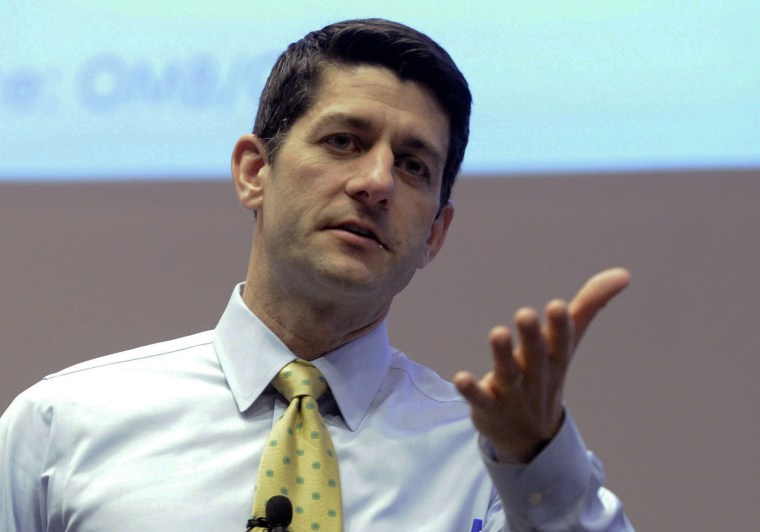There's long been a problem with understanding public attitudes with the Affordable Care Act: the law is far less popular than what's in the law. Ask the American mainstream for their views and most tend to say, "We don't like Obamacare." Ask the American mainstream for their take on the ACA's main provisions and they tend to say, "Those sound like great ideas."
As a practical matter, the discrepancy doesn't mean much, but as a political matter, it makes things a little tricky for both parties. Democrats, for example, aren't getting credit from voters for delivering popular reforms.
But Republicans also face a challenge: when they demand a "repeal" of the law, they're invariably asked, "Including the popular parts?" The answer, more than not is, no -- Republicans usually say they only dislike the unpopular parts.
Aaron Blake
reports, however, that one high-profile Republican leader is willing to go where others won't.
House Budget Committee Chairman Paul Ryan (R-Wis.) says in a new interview that it would be too costly for Republicans to reinstate some of the more popular provisions of Obamacare if and when the law is repealed, but that Republicans should look for alternatives. The former GOP vice presidential nominee was asked on Bloomberg's "Political Capital with Al Hunt" about whether Republicans would keep provisions like requiring coverage for pre-existing conditions, keeping kids on their parents' insurance until they are 26 years old and barring insurance companies from having different rates for those whose jobs include physical labor.
The Affordable Care Act's policy extending coverage to young adults who want to stay on their family plans enjoys broad support -- indeed, at this point it seems like policy no-brainer -- but for Ryan, it'll have to go.
Along with the protections for those with pre-existing conditions.
And the ban on annual and lifetime caps.
And all the other consumer protections that Ryan believes "dramatically crank up the cost" of coverage.
I suppose the Wisconsin Republican deserves at least some credit for candor -- many GOP lawmakers pretend they'd keep the consumer protections, as if they were free -- though that's cold comfort for the millions of families taking advantage of the benefits that Ryan would like to take away.
In fairness, it's worth noting that Ryan says Republicans, after they're done destroying the federal system, would look for alternate ways to reach similar goals. But he also explicitly said these reforms "basically make it impossible to underwrite insurance."
This is important for the public to understand. The main architect of House Republicans' domestic policy agenda, such as it is, intends to scrap coverage for millions by killing the ACA and eliminate consumer protections for those who maintain insurance. That's not my interpretation; that's effectively Ryan's stated position of this afternoon.
And now that the House Budget Committee chairman has said this out loud, I'd expect other congressional Republican incumbents and candidates to ask whether they agree with Ryan on this -- it is, after all, an election year in which the GOP says it's eager to talk about health care.
Update: Brian Beutler, in his last
Salon piece, emphasizes that Ryan's reference to underwriting is "
the key tell."
Before the ACA, most states didn’t guarantee coverage to the ill, or prohibit price discrimination against them. Ryan’s correct that guaranteeing coverage and prohibiting price discrimination is a recipe for much higher premiums, but only because he omits the individual mandate, which ensures that state risk pools will be actuarially balanced. Leave out the mandate, and the insurance industry will likely end up existing to sell very costly health plans to sick people. But Obamacare doesn’t leave out the mandate. And thus, the law can guarantee insurance to everyone without requiring anyone to disclose private details of their health histories to an insurance company, and hold premiums down simultaneously. Anyone who’s signed up for pre-ACA insurance and for ACA insurance can attest to the fact that the elimination of intrusive underwriting forms is a great advancement. All you have to disclose now is your age and tobacco usage. But Paul Ryan wants to bring back underwriting. Because Republicans really don’t agree that insurers should be prohibited from discriminating against the ill. He and other Republicans will vaguely claim to support setting up state-based high-risk pools for people with pre-existing conditions. Coverage ghettos of a sort for the ill. That would be better than nothing if they were genuinely committed to financing them. But financing them would cost hundreds of billions of dollars a decade, and the one time House Republican leaders tried to come up with a tiny fraction of that cost for Obamacare’s transitional high-risk pools, conservatives rebelled and the legislation failed.
